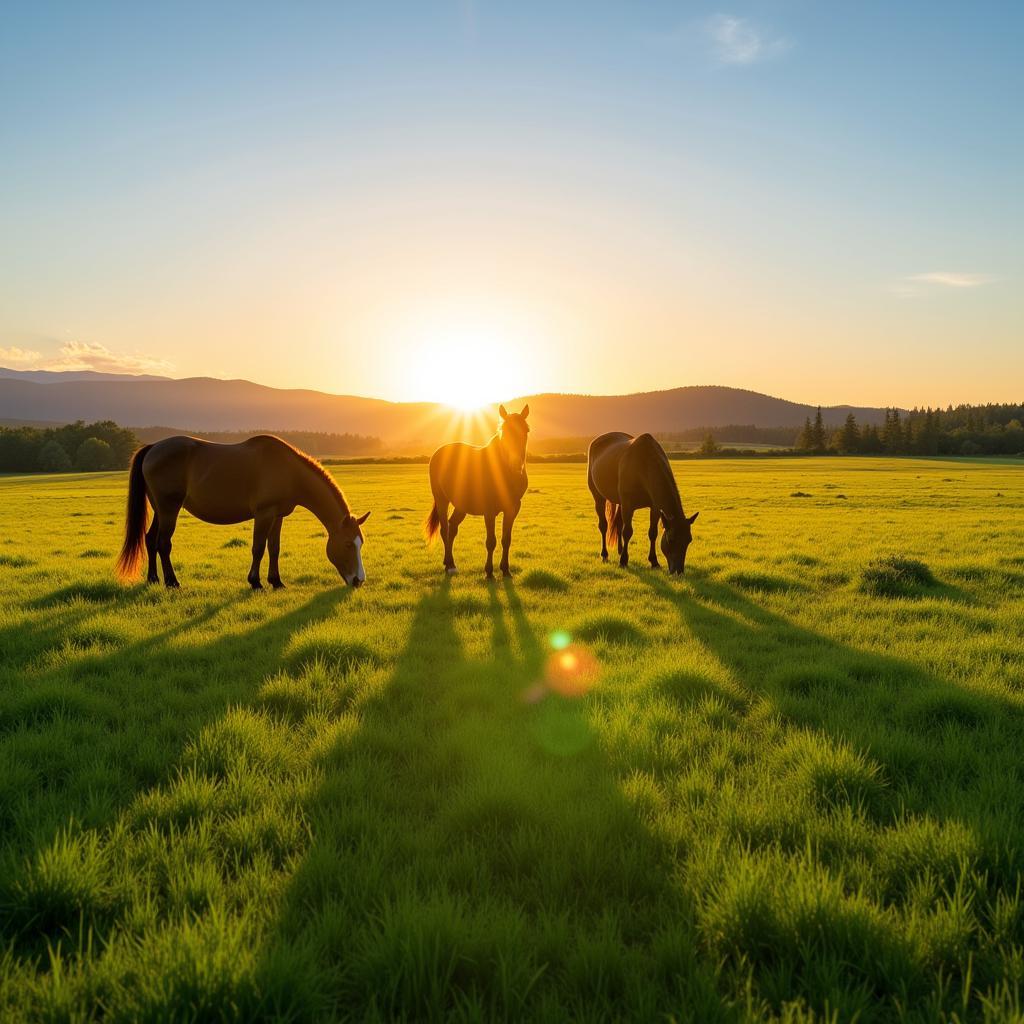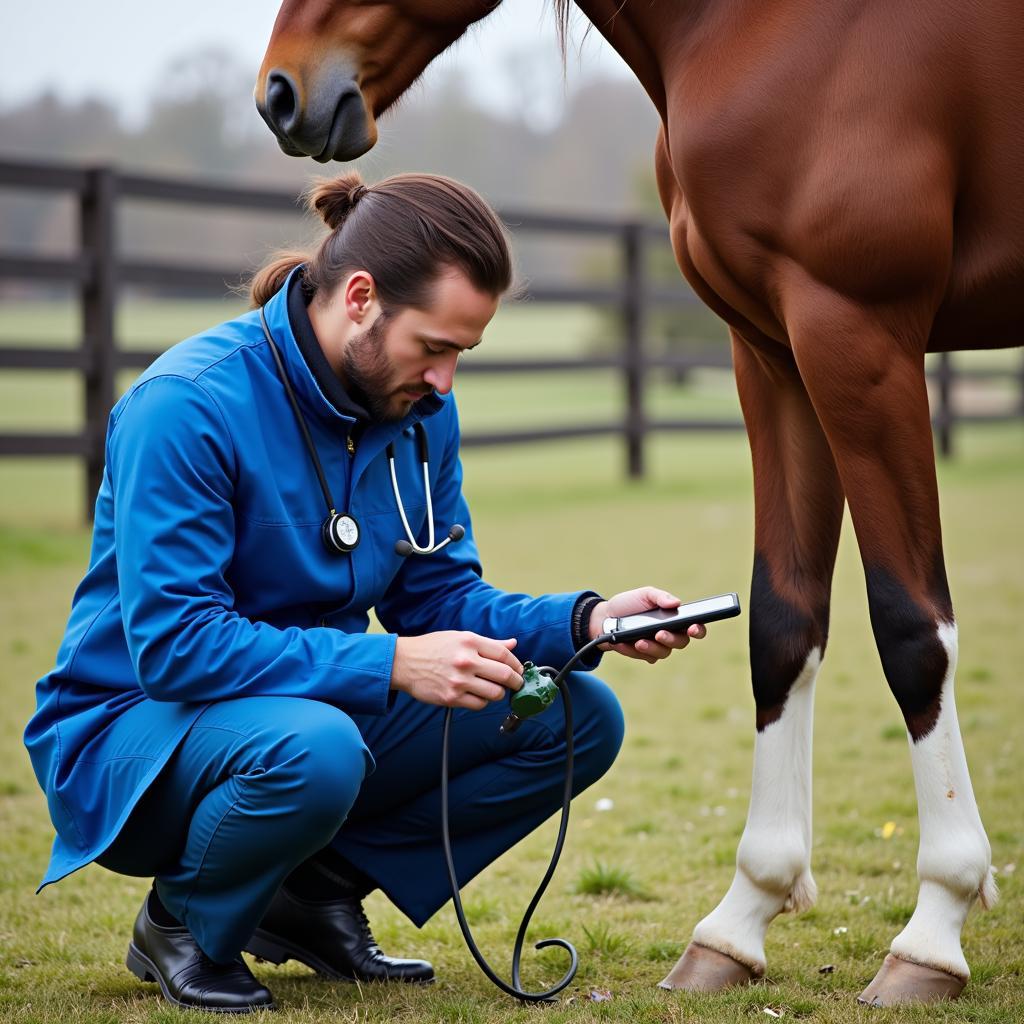When it comes to horse pasture management, timing is everything. Fertilizing is crucial for healthy grass growth, but it also means your horses need a temporary break from grazing. But just How Long After Fertilizing Can Horses Graze again?
The answer isn’t always straightforward. It depends on several factors, including the type of fertilizer used, the application method, and weather conditions.
Factors Influencing Grazing Time After Fertilization
1. Type of Fertilizer:
- Quick-release fertilizers: These are absorbed rapidly and pose a higher risk to horses. They typically require a longer waiting period, usually 14-21 days.
- Slow-release fertilizers: These release nutrients gradually, minimizing risks. A shorter waiting period of 7-14 days is generally safe.
- Organic fertilizers: These natural options like manure decompose slowly, posing minimal risk. You can often allow grazing after 3-7 days.
2. Application Method:
- Granular fertilizer: This type requires watering to break down, making it easier for horses to ingest large amounts. Always wait the full recommended time on the product label.
- Liquid fertilizer: Faster absorption means a slightly shorter waiting time may be possible, but always err on the side of caution.
3. Weather Conditions:
- Rain: Rainfall can wash away fertilizer granules, making them less appealing to horses. However, it’s best to wait until after a rain shower to ensure even distribution.
- Temperature: Hot weather can intensify the effects of fertilizer, increasing the risk of toxicity. Extend the waiting period during heatwaves.
Risks of Grazing Too Soon After Fertilization
Allowing your horse to graze too soon after fertilization can lead to:
- Fertilizer poisoning: Horses are particularly sensitive to nitrogen-based fertilizers. Symptoms include colic, diarrhea, respiratory distress, and even death.
- Laminitis: An inflammatory condition affecting the hooves, laminitis can be triggered by the sugar surge in rapidly growing grass after fertilization.
Tips for Safe Grazing After Fertilization
- Read the label: Always follow the manufacturer’s instructions for the specific fertilizer you’re using.
- Water well: Thorough watering helps disperse fertilizer granules and minimizes the risk of horses ingesting concentrated amounts.
- Mow before grazing: Cutting the grass a few days before allowing horses back on the pasture can help remove any remaining fertilizer residue.
- Introduce horses gradually: Start with short grazing periods and gradually increase the time to allow your horse’s digestive system to adjust.
- Monitor your horse: Watch for any signs of illness or unusual behavior after they resume grazing. Contact your veterinarian immediately if you suspect fertilizer poisoning.
 Horses Grazing on Lush Pasture
Horses Grazing on Lush Pasture
Frequently Asked Questions
1. What are the signs of fertilizer poisoning in horses?
Signs can include colic (abdominal pain), diarrhea, increased thirst, frequent urination, rapid breathing, muscle tremors, and weakness.
2. Can I use herbicides on my horse pasture?
Herbicides can be toxic to horses. It’s crucial to choose horse-safe options and follow the instructions carefully.
3. What type of fertilizer is best for horse pastures?
Slow-release or organic fertilizers are generally preferred as they minimize the risk of toxicity and promote steady, healthy grass growth.
4. How often should I fertilize my horse pasture?
The frequency depends on your soil type, grass variety, and climate. Testing your soil can help determine the optimal fertilization schedule.
5. Can I rotate my horses to a different pasture after fertilization?
Yes, this is a good strategy to allow the fertilized pasture adequate time to absorb the nutrients before your horses graze.
 Veterinarian Examining Horse in Pasture
Veterinarian Examining Horse in Pasture
Need More Help with Your Horse Pasture?
Managing your horse pasture effectively ensures your equine companions have access to safe and nutritious grazing. For personalized advice on fertilization, pasture management, or any other horse-related concerns, don’t hesitate to contact us.
Call: 0772127271
Email: [email protected]
Visit Us: QGM2+WX2, Vị Trung, Vị Thuỷ, Hậu Giang, Việt Nam.
Our dedicated team at Justus Horses USA is here to support you 24/7. We’re passionate about horses and committed to helping you provide the best possible care for your equine partners.